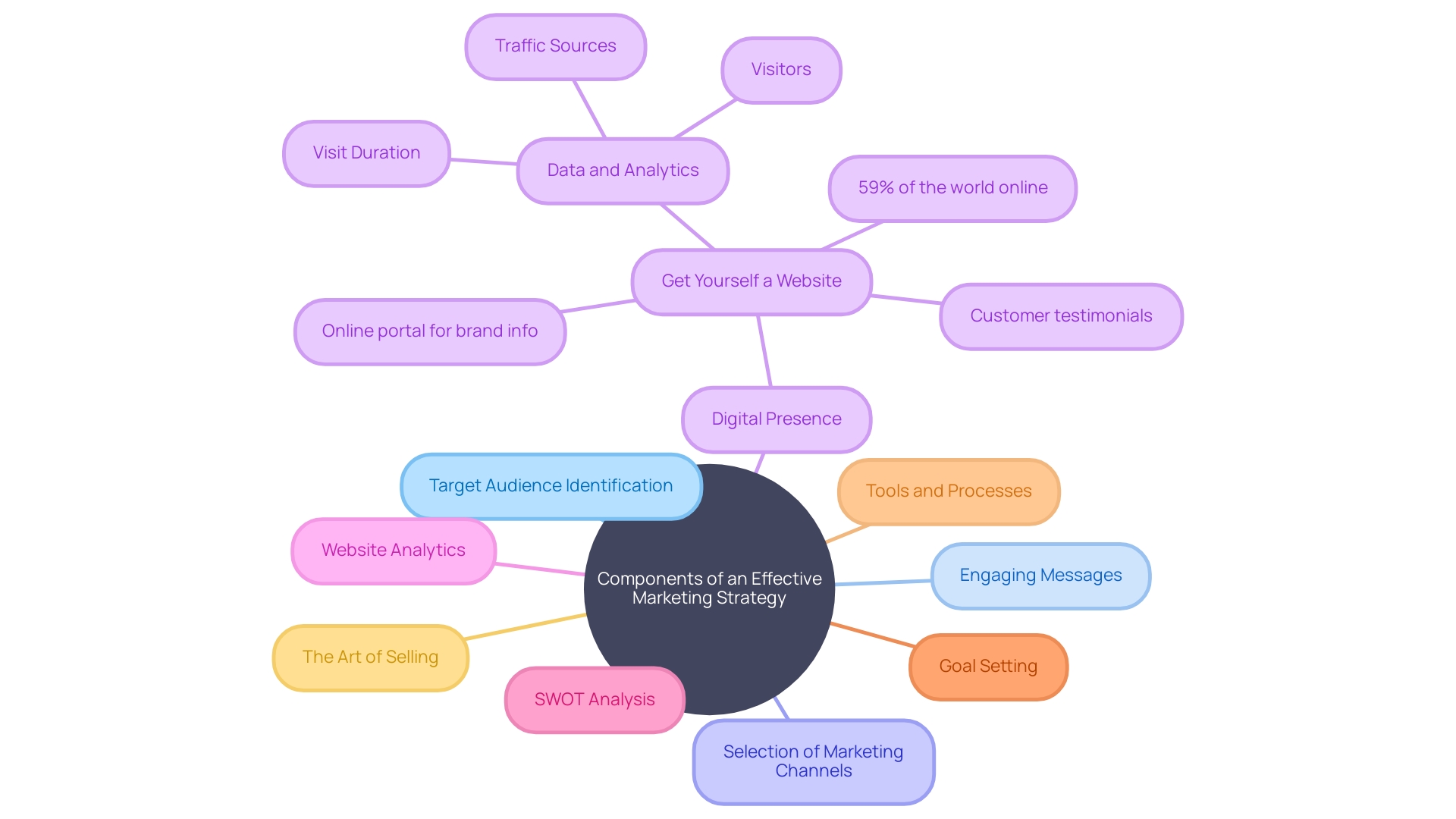Introduction
Small businesses face numerous challenges in their quest for success. From navigating complex markets to managing finances and implementing effective marketing strategies, the path to prosperity is fraught with obstacles. In this article, we will explore four key areas where small businesses often stumble and offer practical advice and solutions to help them overcome these hurdles.
Lack of market research, inadequate business planning, insufficient capital, and poor cash flow management, and ineffective marketing strategies can all hinder growth and sustainability. By addressing these issues head-on, small businesses can position themselves for long-term success in a competitive landscape. Join us as we delve into the importance of market research, the necessity of a comprehensive business plan, the significance of financial management, and the power of effective marketing strategies.
Lack of Market Research and Understanding
To guarantee durability and prosperity, small enterprises must navigate the intricate terrains of their industries with accuracy and understanding. An essential element in this pursuit is conducting research, a tool that provides a detailed view of consumer preferences, industry demands, and the constantly evolving trends shaping industry horizons. Equipped with such knowledge, companies can develop strategies with the finesse required to engage their target market and outperform rivals.
Market research isn't just about keeping tabs on current trends; it's about delving into the fabric of the market to stitch together a narrative that informs every decision. Primary research, the practice of collecting firsthand data, stands as the bedrock of this endeavor. Through surveys, interviews, and observational studies, enterprises can collect valuable insights directly from their audience, gaining a clear picture of customer satisfaction and experience.
Moreover, the importance of data literacy cannot be overstated. In a world filled with data, the capacity to distinguish valuable information from noise is a vital skill for enterprises. It allows a deeper comprehension of the connections between various data sets, empowering organizations to uncover concealed opportunities and make data-driven decisions.
The Fiserv Small Business Index underscores the resilience of enterprises in adapting to economic shifts, highlighting the need for robust market analysis to remain competitive. Moreover, grants and innovative products such as Apple's latest offerings introduce new opportunities for expansion, highlighting the importance for enterprises to stay knowledgeable and adaptable to new advancements.
Overall, dedicating time and resources to extensive market exploration is not a choice but an essential requirement for enterprises aiming to flourish. By adopting primary research methods and improving data literacy, companies can access a treasure trove of information, customize their products to fulfill particular customer needs, and maneuver the industry with assurance.
Inadequate Business Planning
A thorough strategy is the foundation of a thriving microenterprise. It not only sets out clear goals and strategies but also addresses the competitive landscape, financial forecasts, and operational directives. This strategy serves as a guiding instrument for directing the enterprise through the intricacies of the industry and ensuring well-informed decision-making. An intricately designed strategic outline is especially vital as enterprises encounter the impact of market volatility—whether it be due to technological interruptions, economic changes similar to those observed during the COVID-19 outbreak, or shifting consumer tendencies. Recent data indicates that a massive 33.2 million enterprises operate in the United States alone, highlighting the intense competition within this industry. However, numerous enterprises fail to recognize the significance of a tactical blueprint, which can result in fragmented operations and a dearth of guidance.
For instance, the story of BetterBlends, a small enterprise that started with promise but faltered due to inconsistent operations and a lack of discipline, reflects the consequences of inadequate planning. Customer reviews emphasized problems such as inconsistent operating hours and unkept commitments, resulting in a loss of confidence and eventual shutdown. This real-world example underscores the necessity of a solid foundation that a comprehensive plan provides.
Moreover, enterprises must stay watchful in maintaining their digital presence accurately. With the rise of online platforms like Google Maps and Apple Maps, incorrect information can lead to missed opportunities and customer frustration. Tech expert Erica Mealy emphasizes the difficulties that enterprises encounter with inaccurate online listings, underscoring the significance of actively overseeing digital information.
Small enterprises are essential to the economy, making up half of all employment, and their flexibility has been put to the test repeatedly. One in five small firms had to shift to a new model during the pandemic, a testament to the resilience required to thrive. Nevertheless, lacking a robust strategy, such flexibility can be aimless. As per James Mohs from the University of New Haven's guidance, considering alternatives such as refinancing or mergers should be integrated into a more comprehensive strategic framework that guarantees decisions are taken with the long-term sustainability of the organization at the forefront.
In essence, creating a strong strategy is not merely a process of documenting but a vital requirement for enterprises of limited size. It lays out a clear path for growth, equips owners with the knowledge to navigate market challenges, and enables them to adapt to change with confidence. Given that smaller enterprises constitute a significant portion of the commercial community, it is evident that their prosperity is crucial for the overall well-being of the economy, thereby emphasizing the necessity for comprehensive strategizing.

Insufficient Capital and Poor Cash Flow Management
A strong financial basis is crucial for success in the entrepreneurial world. Insufficient capital and inadequate cash flow management are crucial factors that can result in struggles or even failure in enterprises. Numerous enterprises of limited scale have encountered life-or-death challenges, with a third undergoing a critical situation within the previous five years. In light of these challenges, effective financial management becomes paramount, incorporating rigorous budgeting, vigilant cash flow monitoring, and the curtailment of superfluous expenditures.
Ensuring the timely collection of payments is equally important. With the growth of e-commerce, enterprises can now access global markets, potentially boosting their revenue streams and enhancing cash flow. However, they must also maintain low overheads to maximize their gross margins, which is the revenue remaining after the cost of goods sold has been deducted. A healthy gross margin is crucial—it's the difference between surviving and thriving in today's competitive environment.
Furthermore, small enterprises should contemplate various funding channels to strengthen their capital reserves. This could mean seeking loans, engaging with investors, or even exploring government and commercial enterprise organization support, especially as enterprises face challenges from rapid technological changes, economic pressures, and legislative transformations. Amidst the pandemic, almost 50% of small and medium-sized enterprises experienced a reduction in revenue, and 20% shifted to alternative models, highlighting the significance of flexibility and availability of funds.
In the end, ensuring strong cash flow and effectively handling financial resources are not only tactics but essential for enterprises seeking to navigate the unpredictable seas of the corporate realm and come out triumphant.
Ineffective Marketing Strategies
For businesses with limited size, the absence of a robust marketing strategy can be a significant barrier to success. Lacking a solid plan to identify and engage their target audience, enterprises risk falling into obscurity, unable to stir brand awareness or generate essential leads. Such a deficiency not only leads to wasted resources but also inhibits the ability to cultivate customer relationships and capture business opportunities.
To navigate away from this predicament, it's imperative for small enterprises to cultivate potent marketing strategies. This requires a meticulous understanding of the target demographic's needs and preferences, coupled with crafting messages that strike a chord with potential customers. A vital component of an effective marketing mix is the judicious selection of channels—be it the dynamism of social media, the informative nature of content marketing, or the reach of traditional advertising—to ensure that the communication is as impactful as possible.
Embracing the digital age, for instance, is no longer optional. Without a digital presence, like a website, companies that lack an online presence miss the opportunity to reach a substantial portion of the global population. A website serves not just as a sales platform but as a repository of brand identity, customer feedback, and expertise. The insights gained from website analytics can guide companies in refining their marketing strategies further.
Moreover, understanding the competitive landscape through a SWOT analysis can illuminate strengths to capitalize on and weaknesses to address. Defining clear, achievable goals within specific timeframes can streamline marketing efforts, whether the aim is to broaden market share, launch new offerings, or enhance customer satisfaction. Using the appropriate tools and processes to create a marketing strategy can propel a company from stagnation to active expansion.
The fact is, in the ruthless environment of commerce, especially where established rivals dominate, inaction in marketing is equivalent to admitting defeat. Consider the hypothetical case of Company XYZ that forwent consistent marketing and fell prey to more aggressive rivals. Similarly, Guthrie-Jensen Consultants emphasize the importance of a robust marketing strategy to look back and evaluate which approaches have resulted in success.
In the end, the art of selling, or the ability to persuasively express the value of a decision, is a crucial skill set for any entrepreneur. This proficiency aids not just in customer acquisition but also in securing financing, attracting investors, and negotiating distribution deals. With creativity, strategic planning, and leveraging tools like The Milton Scene Business Membership, even businesses with limited resources can craft powerful marketing plans that drive success.

Conclusion
In conclusion, small businesses must address key challenges to achieve long-term success. This includes investing in comprehensive market research to understand consumer preferences and industry trends. Developing robust business plans is crucial for setting clear goals and guiding decision-making in a competitive landscape.
Effective financial management, including budgeting and cash flow monitoring, is essential for navigating economic shifts. Implementing impactful marketing strategies, such as understanding the target audience and embracing digital platforms, is vital for attracting customers. By addressing these challenges head-on, small businesses can position themselves for growth and sustainability.
Investing in market research, developing comprehensive business plans, managing finances effectively, and implementing impactful marketing strategies will enable small businesses to thrive in a competitive landscape.
Take action now and position your small business for growth and sustainability!




